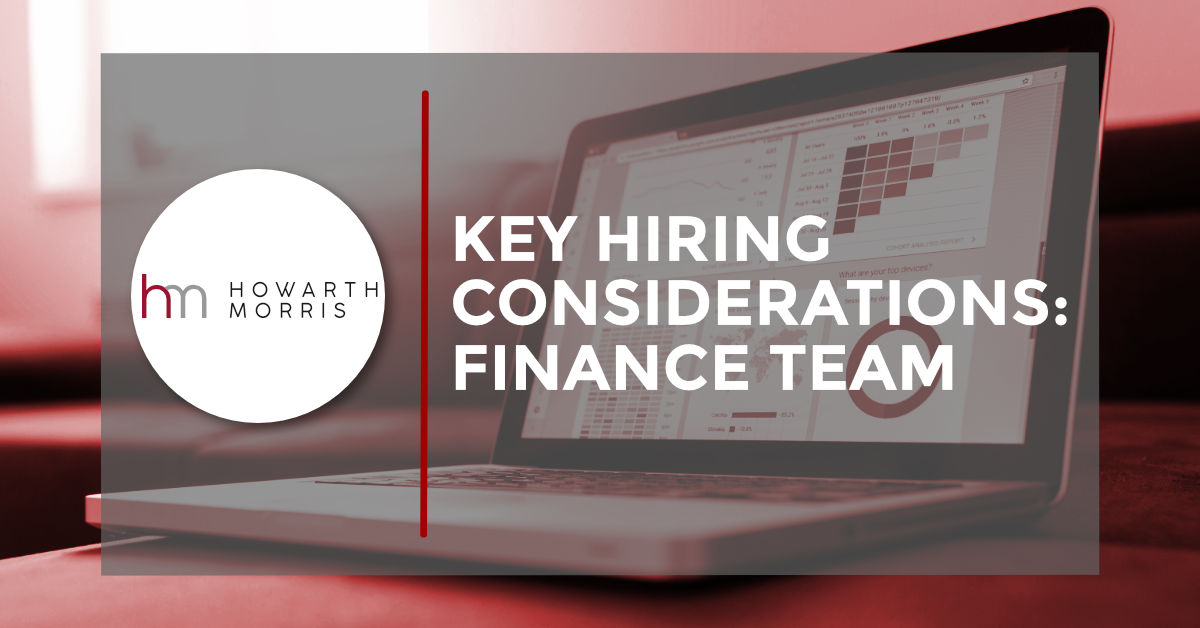Key Hiring Considerations: Finance Team

When it comes to attaining growth for your business, settling for anything less than the best should not be an option. We have first-hand experience with roles in the financial sector and know that finance teams play a pivotal part in a company’s growth and success.
Having a good finance team is important to any business, so getting the hire right is key. Having a structured hiring procedure will not only help you source the best talent for your business, it will also ensure that you are utilising the process to its full potential; resulting in time-efficient and proactive recruitment.
The following key elements are explored in this blog:
- The skill-set considerations of a finance team
- Key points to include in the job description
- Interview structure and execution
The skill-set considerations for a finance team
A competent finance team will have a specialised skill-set. When hiring, you should ensure that the aspirations you have for your finance team are reflected in the skill-set of the person you’re looking for. During the hiring process, it might be helpful to ask yourself the following questions:
- What qualifications do they need?
- Do we need to offer training opportunities – either for hard or soft skills?
- What previous experience is desirable?
Controlling the essential financial aspects of a business may require refined knowledge and specialist experience. Hiring a candidate that ticks all of these boxes will ensure timely financial reporting and strong analytical and forecasting ability.
For roles of a higher level, it can be helpful to look for:
- Competency in accounting software
- More than 5 years of experience in a similar role
- Exceptional administration and coordination skills
- Research expertise and forecasting acumen
- Preferably the candidate will obtain a professional qualification like CIMA/ACCA/ICAEW/ICAS
Whether you are recruiting for an entirely new team or searching for new blood, we have the tools and expertise to aid you in securing the best talent for your business, find out more here.
Establishing a job description
As with any job description, keeping it clear and concise is key. The ideal description will have a perfect balance between providing enough detail so candidates understand the role and your company while keeping it to the point and relevant.
Put yourself in the position of a job seeker and identify the keywords that you would use to search for finance team openings, such as:
- Management Accountant
- Financial Accountant
- Assistant Accountant
- Treasury Manager
- Payroll Manager
- Credit Manager
- Transactions Manager
- Financial Analyst
- FP&A Manager
- Finance Manager
- Finance Director
- Financial Controller
- Assistant Financial Controller
Consider the best platforms for advertising the role, and explore the options you have in terms of recruitment. To discuss these options, get in touch with one of our specialist consultants today.
Interviewing for the role
A well-structured interview will allow you to determine the personality type of each candidate, how they might react under stress and the strength of their interpersonal skills. Interviews are also the ideal time to probe and ensure that everything on the candidate’s CV is true.
Construct the perfect interview with the following tips:
- Be sure that you have enough time set aside for each interview. Being rushed, disorganised or unprepared will not look good from a candidate’s perspective.
- Carefully study each resume ahead of time, and have a hard copy to hand during the interview.
- Be knowledgeable of the candidate’s experience; this will enable you to dig deeper and allow for more productive use of time. This is your chance to scope out the candidate’s knowledge of the role they have applied for and understanding of the workings for your finance team, they should demonstrate exceptional attentiveness across all required areas.
- Discuss the job role in more detail, let them know what the core duties and responsibilities will be and ask if they have any questions.
How to execute the interview:
As a result of the COVID-19 pandemic, many companies have had to adapt to working remotely, and in most cases there have been no exceptions for interviewing and onboarding new staff.
If you are interviewing remotely, be sure to treat the interview how you would if it were face-to-face. Using the right video interviewing tool is key to delivering a consistent, professional and standardised interview process. Our answer to this is HM Vantage, a market-leading, fully secure video interviewing technology designed specifically for the UK professional recruitment sector. Learn more about how HM Vantage can help you leverage and accelerate your recruitment process here.
Remember: It can be tempting to reschedule or make last-minute changes to online meetings, this should be avoided. The initial interview is likely the candidate’s first insight into how your company operates – so it is paramount that you ensure you meet their expectations of you.
Read our blogs on How to Overcome 4 Key Challenges of Remote Management and 4 Tips to Onboard Remote Employees if you would like further advice on the topic of remote working effectively.
We hope you have found this blog both insightful and inspiring. For further information, tips and advice contact us at info@howarthmorris.co.uk.
